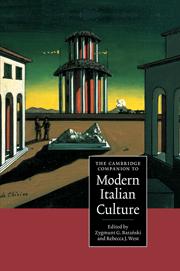Book contents
- Frontmatter
- Introducing modern Italian culture
- 1 The notion of Italy
- 2 Social and political cultures in Italy from 1860 to the present day
- 3 Questions of language
- 4 Intellectuals, culture and power in modern Italy
- 5 Catholicism
- 6 Socialism, Communism and other ‘isms’
- 7 Other voices: contesting the status quo
- 8 Narratives of self and society
- 9 Searching for new languages: modern Italian poetry
- 10 Drama: realism, identity and reality on stage
- 11 Italian cinema
- 12 Art in modern Italy: from the Macchiaioli to the Transavanguardia
- 13 A modern identity for a new nation: design in Italy since 1860
- 14 Fashion: narration and nation
- 15 The media
- 16 Since Verdi: Italian serious music 1860-1995
- 17 Folk music and popular song from the nineteenth century to the 1990s
- 18 Epilogue: Italian culture or multiculture in the new millennium?
- Index
- Series List
2 - Social and political cultures in Italy from 1860 to the present day
Published online by Cambridge University Press: 28 May 2006
- Frontmatter
- Introducing modern Italian culture
- 1 The notion of Italy
- 2 Social and political cultures in Italy from 1860 to the present day
- 3 Questions of language
- 4 Intellectuals, culture and power in modern Italy
- 5 Catholicism
- 6 Socialism, Communism and other ‘isms’
- 7 Other voices: contesting the status quo
- 8 Narratives of self and society
- 9 Searching for new languages: modern Italian poetry
- 10 Drama: realism, identity and reality on stage
- 11 Italian cinema
- 12 Art in modern Italy: from the Macchiaioli to the Transavanguardia
- 13 A modern identity for a new nation: design in Italy since 1860
- 14 Fashion: narration and nation
- 15 The media
- 16 Since Verdi: Italian serious music 1860-1995
- 17 Folk music and popular song from the nineteenth century to the 1990s
- 18 Epilogue: Italian culture or multiculture in the new millennium?
- Index
- Series List
Summary
Introduction
It is almost inevitable for historians to look back upon the past with an eye on the present, partly because they are influenced by later developments, and partly because contemporary debates relating to culture, politics and society actively lead them to reconsider past events in a new light, bringing out analogies with and meanings for the present. The collapse of Communism and the end of the Cold War have accentuated this tendency. This is not surprising, since the most pressing issues facing Italy today, namely, regional disparities, the need for electoral and institutional change (the creation of a 'Second Republic'), clientelism and corruption, and national unity itself, can be considered as the resurfacing of unresolved problems. Now that the period dominated by the Cold War can be encapsulated within a precise time span, and the transition to a Second Republic is proving less smooth than might have been expected in the early 1990s, it is as if Italy's political agenda is being directly linked to concerns which predate that period and go back to the process of unification. One of these debates focuses on questions of nationhood and identity, questions which Italy is asking together with the rest of Europe, since, almost inevitably, such matters become prominent at moments of great political change. Nevertheless, in Italy these questions seem to revolve specifically around the country’s failure to create a collective national identity. According to the sociologist Roberto Cartocci, Italy’s present-day task is still the one d’Azeglio succinctly summarized after unification in his famous saying: ‘Italy is made; now the Italians must be made.’
- Type
- Chapter
- Information
- The Cambridge Companion to Modern Italian Culture , pp. 35 - 62Publisher: Cambridge University PressPrint publication year: 2001
- 5
- Cited by



